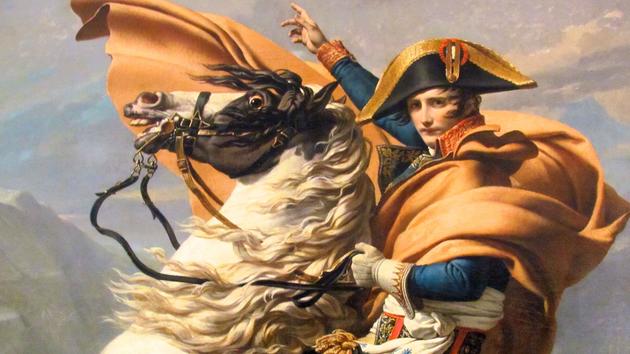Bernard Carayon is a former member of Tarn, mayor of Lavaur and lawyer at the Paris bar.
To commemorate the disappearance, two hundred years ago, of Napoleon, in a country which forgot to celebrate Austerlitz when the English celebrated Waterloo, is almost a provocation.
Yet this is what I will do in my city where the imperial adventure resonates: in Lavaur, stands the statue of Las Cases, the memorialist of Saint Helena, and lies, under a lovingly restored tomb, one of the last Mamluks of the Emperor.
To commemorate Napoleon is to celebrate the Nation of panache, adventure and intelligence.
What France is no longer, but must become again.
And it is because its detractors, indigenous and racialists, illiterate from the inner springs of our country, are foreign to the French soul, that our compatriots have a natural reason to proclaim their admiration of the Emperor.
Because he was, also, for the civilized world, the great and dazzling adventure of the XIXth century: the Alexander or the Tamerlan of modern times.
To read also:
Arthur Chevallier: "The Republic owes its survival to Napoleon in 1799"
In Les Déracinés, Barrès describes the pious visit of teenagers from Lorraine to the tomb of the Invalides with their “
energy teacher
”.
There, "
we do not hear the silence of the dead but a heroic rumor
".
These “
ordinary
”
children
had thus acquired “
the spirit of a bunch of young tigers
”.
And it is in columns, in tight rows, that the children of France should be taken under the imperial necropolis.
The bicentenary of Napoleon's death also sounds like the return of History, of Nations like Empires, clashes of civilizations and tragedies.
Because the bicentenary of Napoleon's death also sounds like the return of History, of Nations and Empires, of clashes of civilizations and of tragedies.
Decades of merchant and guilt-inducing globalization of the West have, in fact, uprooted the heirs of a civilization to transform them into individualistic and hedonistic consumers, far from the figure of the hero who crosses our history.
History is first and foremost the story of the wars which forged the identity of peoples.
And what is true for Algeria, for example, is a fortiori for us, weighed down by 1,500 epic years.
To read also:
Thierry Lentz: "We will commemorate Napoleon, it is about what we are!"
Wars, conquests and retreats are dates: 451 for Les Champs Catalauniques, 1571 for Lepanto, but also 1799 for 18 Brumaire, 1805 for Austerlitz and 1806 for Iena.
A chronology, clear, antidote to the contemporary interpretations which litter the teaching method of Ernest Lavisse and Jacques Bainville, and the pride of the neo-Marxist ideology conveyed by the pseudo
social
"
sciences
".
One cannot understand the birth of German nationalism or the thought of Clausewitz and Hegel without measuring, on the evening of October 14, the disaster in Prussia.
We cannot grasp the soul of France without imagining how much it oscillates between revolutionary disorder and the aspiration for a new order, on the eve of 18 Brumaire.
Hated by republicans and royalists alike, Napoleon put an end to the disorders and horrors of the Revolution, while preserving his spirit in shaping a new elite.
History and its knowledge thus forge personalities.
Literature and geography almost as much.
Those who have resigned themselves to the government of judges and submit to that of public opinion have learned neither from the resistance to the reforms of the Parliaments of the Ancien Régime, nor from the radical temptation of a people who do not has only the street to express itself.
The refusal to celebrate Austerlitz in 2005 was cowardly.
And a singular ingratitude with regard to what the Empire was: a State endowed with a backbone with its Prefects, the Council of State and the Court of Auditors;
a right for all citizens, civil and penal, inspired by the principles of the Revolution;
the country's future assured by the training of its children, civilian with the baccalaureate and the University, military with Saint-Cyr.
A scientific ambition backed by the spirit of conquest in Egypt: and it doesn't matter if there was looting in Europe as long as their treasures were gathered in one of the cradles of European civilization.
Hated by republicans and royalists alike, Napoleon put an end to the disorders and horrors of the Revolution, while preserving his spirit in the shaping of a new elite: it is no longer birth that commands access to the most high responsibilities, but courage and intelligence.
Where do his marshals come from?
People.
He conquered Europe, but in the name of the Rights proclaimed in 1789. Sorrowful spirits will underline his gray areas.
The grandeur, the panache and the spirit of conquest are unbearable to them.
But with us, in Lavaur, it is to the brass and drums of the march of the consular guard of Marengo that we will also salute, the memory of one of our own, Marshal Soult. And that I will salute this young man, my grandfather, who left his native Tarn to join Saint-Cyr and serve the Emperor as an artillery lieutenant, with honor and loyalty.









/cloudfront-eu-central-1.images.arcpublishing.com/prisa/2C5HI6YHNFHDLJSBNWHOIAS2AE.jpeg)




